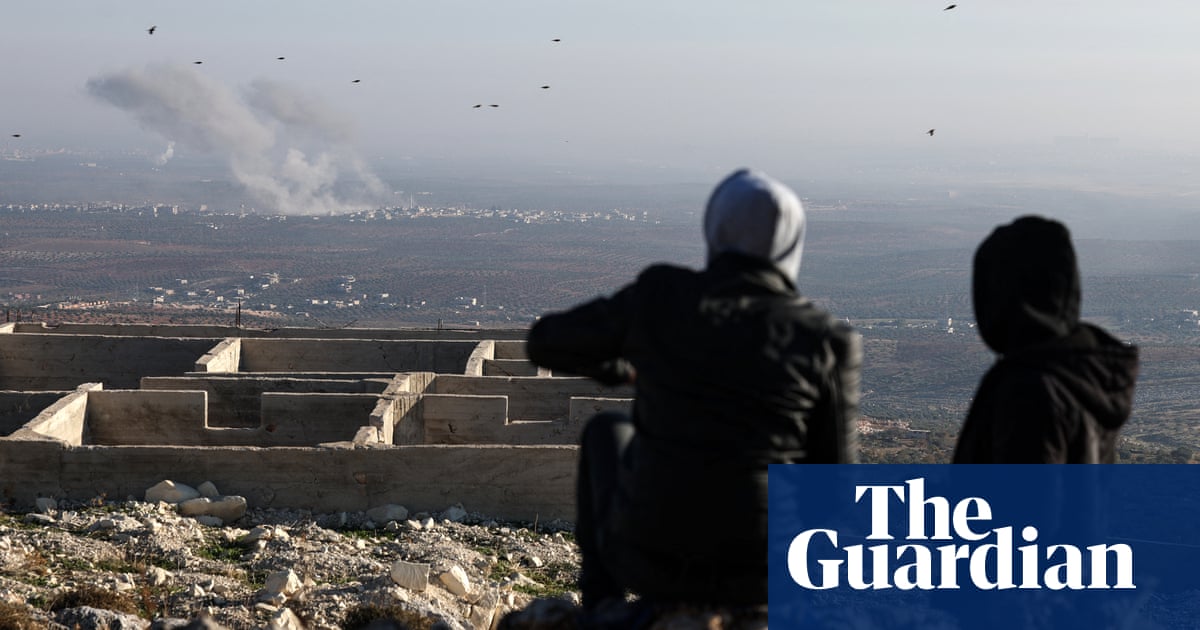Jihadist fighters have cut off a road between Damascus and Aleppo during an offensive that a monitor says has killed about 200 people, including civilians hit by Russian air force strikes.
On Wednesday the jihadist group Hayat Tahrir al-Sham (HTS) and allied factions launched a surprise attack on government-held areas of northern Aleppo province, triggering the fiercest fighting in years, the Syrian Observatory for Human Rights said.
The toll in ongoing battles “has risen to 182, including 102 fighters from HTS”, 19 from allied factions “and 61 regime forces and allied groups”, the observatory said.
Rami Abdulrahman, who heads the observatory, said Russian airstrikes on the Aleppo countryside killed 19 civilians on Thursday,and another civilian had been killed in Syrian army shelling a day earlier.
Russia is a close ally of the Syrian president, Bashar al-Assad, and first intervened in Syria’s civil war in 2015, turning the momentum of the conflict in favour of the president, whose forces once controlled only a fifth of the country.
The British-based observatory said that on Thursday HTS and its allied factions, including groups backed by neighbouring Turkey, “cut off the Damascus-Aleppo international M5 highway … in addition to controlling the junction between the M4 and M5 highways”.
“The highway has now been put out of service, after it was reopened by regime forces years ago,” said the monitor, which has a network of sources inside Syria.
The junction of the M5 and M4 highways connects the capital and the regime coastal stronghold Latakia with the second city of Aleppo.
Syria has been gripped by civil war for more than a decade, although the intensity of the conflict had decreased in recent years.
The clashes are happening in an area straddling Idlib and Aleppo provinces, some of them less than 6 miles (10km) south-west of the outskirts of Aleppo city.
Mohamed Bashir, who heads HTS’s so-called “salvation government”, said during a press conference: “This operation aims to repel the sources of fire of the criminal enemy from the frontlines.”
Nick Heras, an analyst with the New Lines Institute for Strategy and Policy, said the rebels were “trying to pre-empt the possibility of a Syrian military campaign in the region of Aleppo, which Russian and Syrian government airstrikes against rebel areas have been preparing for”.
With some Turkey-backed factions joining the offensive, he said, “Ankara is sending a message to both Damascus and Moscow to back down from their military efforts in north-west Syria”.
As well as Russia, Assad has been backed in the civil war by Iran and allied militant groups, including Lebanon’s Hezbollah.
A general in Iran’s Revolutionary Guards was killed in Syria on Thursday during fighting between Syrian government forces and jihadists, an Iranian news agency reported.
During more than two months of war with Hezbollah in Lebanon, Israel intensified its strikes on Iran-backed groups in Syria including Hezbollah.
Heras said rebel forces “are in a better position to take and seize villages than Russian-backed Syrian government forces, while the Iranians are focused on Lebanon”.
The Syrian jihadists and their allies launched their attack the day the Lebanon-Israel truce came into effect. Haid Haid, an analyst, said the rebels had been “planning for this offensive for quite a while”. But “if the rebel forces waited too long the regime would have been able to reinforce their frontlines as Hezbollah forces are no longer busy with the war in Lebanon”.
HTS, led by al-Qaida’s former Syria branch, controls swathes of the north-west Idlib area as well as small parts of neighbouring Aleppo, Hama and Latakia provinces.
Syria’s conflict broke out after Assad crushed anti-government protests in 2011, spiralling into a complex conflict that has drawn in foreign armies and jihadists. It has killed more than 500,000 people, displaced millions and battered the country’s infrastructure and industry.
The Idlib region is subject to a ceasefire – repeatedly violated but which had largely been holding – brokered by Turkey and Russia after a Syrian government offensive in March 2020.

